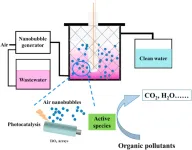(Press-News.org) 1. Experts say it’s not yet time to take off masks in the health care setting
Abstract: https://www.acpjournals.org/doi/10.7326/M23-1190
URL goes live when the embargo lifts
A new commentary from infectious disease experts at George Washington University School of Medicine and the National Institutes of Health (NIH) says for patient safety, masking should continue in health care settings. This message conflicts with a recent commentary from authors from 8 U.S. institutions suggesting that the time for universal masking is over. The commentary is published in Annals of Internal Medicine.
Masking has been a controversial mitigation strategy during the COVID-19 pandemic because high-quality evidence of efficacy is lacking and because the topic has become highly politicized. Regardless, real-world experience demonstrates the effectiveness of mask-wearing in clinical settings where data shows that transmission from patient-to-staff and staff-to-patent, when both are masked, is uncommon. Since health care personnel report being driven to show up for work even when they are ill themselves, the argument in support of mask-wearing becomes even more compelling.
Those without symptoms may also transmit respiratory viruses, particularly SARS-CoV-2. While the Omicron strain has been milder, infection could still cause severe or life-threatening disease or prolonged illness if transmitted to at-risk patients, such as the elderly or immunocompromised. With the still-looming risks, now does not seem the time to take off masks in the health care setting. Instead, the authors advocate strongly for continued mask use for infection prevention.
Media contacts: For an embargoed PDF, please contact Angela Collom at acollom@acponline.org. To speak with corresponding author David K. Henderson, MD, please email dhenderson@cc.nih.gov.
----------------------------
2. Updated evidence suggests masks may reduce risk for SARS-CoV-2 infection in community and health care settings
A beneficial effect of N95 respirators in health care settings could not be ruled out
Abstract: https://www.acpjournals.org/doi/10.7326/M23-0570
Editorial: https://www.acpjournals.org/doi/10.7326/M23-1120
URL goes live when the embargo lifts
The final and major update to a rapid, living review of published evidence suggests that masks may be associated with a small reduction in risk for COVID-19 infection in community settings versus no mask use and both surgical masks and N95 respirators may be associated with similar infection risk in routine patient care settings. However, a beneficial effect of N95 respirators could not be ruled out in the health care setting. The review is published in Annals of Internal Medicine.
In June 2020, Annals published an initial living review of research on mask use which found insufficient evidence to determine effects of masks on COVID-19 infection. The initial review was followed by eight brief updates that found low to moderate strength evidence for an association between mask use and decreased risk for SARS-CoV-2 infection in community settings, but evidence on N95 versus surgical masks in health care settings and risk for COVID-19 infection remained insufficient. This 9th and final review is different because it includes enough evidence to be considered a major update.
Investigators from Oregon Health & Science University reviewed three randomized trials and 21 observational studies to update an evidence synthesis on N95, surgical, and cloth mask effectiveness in community and health care settings for preventing SARS-CoV-2 infection. The authors found that mask use may be associated with a small, reduced risk for COVID-19 infection versus no mask use in community settings. However, they note that that the interventions, settings, and populations included in the reviewed studies varied and adherence was suboptimal, which may have impacted outcomes. The authors note that trial and observational studies of surgical or N95 mask use compared with no mask were imprecise or limited, with evidence on other mask comparisons in health care settings remaining insufficient.
An accompanying editorial by Annals Editor-in-Chief Christine Laine, MD, MPH and Deputy Editor Stephanie Chang, MD, MPH provides important context for understanding why recent evidence reviews do not provide a definitive answer about the benefits of masking. Studies vary widely in what they are designed to determine, such as the effectiveness of masks at preventing viral penetration or the effectiveness of masking recommendations. Because these studies are conducted in the real world where infection risk-reduction strategies also vary, it may be difficult to determine the effectiveness of a single component of that strategy. And finally, the authors say we must be explicit in weighing benefits and harms. While some may consider any evidence of benefit sufficient to justify masking, others believe that inconvenience, discomfort, or communication impedance outweigh small benefits. To get to the truth about masking, the authors say it is imperative to design studies that fill information gaps, interpret the evidence accurately, and are honest about what we do and do not know.
Media contacts: For an embargoed PDF, please contact Angela Collom at acollom@acponline.org. To speak with corresponding author Roger Chou, MD, please contact Erik Robertson at robineri@ohsu.edu.
----------------------------
3. Adding a single data point to COVID-19 reporting may more accurately convey the real-time burden of infection in health care settings
Abstract: https://www.acpjournals.org/doi/10.7326/M23-0618
URL goes live when the embargo lifts
In a new ‘Medicine and Public Issues,’ authors from Tufts Medical Center, Veterans Affairs Boston Healthcare System, Harvard Medical School and the Massachusetts Department of Public Health advocate for the inclusion of both the total number of COVID-19 hospitalizations daily and the number of inpatients who received dexamethasone at any point during their hospital stay. The authors emphasize that the addition of this data element is an easy and much-needed update to COVID-19 surveillance efforts that may help to more accurately convey the real-time burden of a rapidly changing infection in health care settings. The article is published in Annals of Internal Medicine.
On 10 January 2022, the Massachusetts Department of Public Health (MDPH) began requiring hospitals to expand surveillance to include reports of both the total number of COVID-19 hospitalizations daily and the number of inpatients who received dexamethasone at any point during their hospital stay. This requirement was added because dexamethasone administration had been shown to be highly correlated with disease severity and was sensitive to the changing epidemiology of new immune-evasive COVID-19 variants.
The authors highlight that the purpose of the ongoing requirement by the MDPH to report dexamethasone is not to minimize pandemic impacts, but to instead understand the ongoing burden of the pandemic in the setting of a changing landscape of population immunity and viral variants. The authors point to COVID-19 data collected from all 68 acute care hospitals in Massachusetts between January 2022 and January 2023, which show that the proportion of persons hospitalized for COVID-19 who received dexamethasone decreased from 49.6 to 33 percent. According to the authors, these data have been used to communicate risk and weigh community-level recommendations by health authorities. They also emphasize that their experience highlights the importance of ongoing review and reevaluation to maintain the utility and predictive value of public health surveillance definitions.
Media contacts: For an embargoed PDF, please contact Angela Collom at acollom@acponline.org. To speak with corresponding author Shira Doron, MD, MS, please email Jeremy Lechan at jlechan@tuftsmedicalcenter.org.
----------------------------
Also new in this issue:
Gatekeepers of Extermination: SS Camp Physicians and Their Scope of Action
Nico Biermanns, MEd
History of Medicine
Abstract: https://www.acpjournals.org/doi/10.7326/M23-0362
END
Experts say it’s not yet time to take off masks in the health care setting
Embargoed News from Annals of Internal Medicine
2023-05-16
ELSE PRESS RELEASES FROM THIS DATE:
The number of the world's farms to halve by 2100, study shows
2023-05-16
New University of Colorado Boulder research shows the number of farms globally will shrink in half as the size of the average existing farms doubles by the end of the 21st century, posing significant risks to the world’s food systems.
Published today in the journal Nature Sustainability, the study is the first to track the number and size of farms year-over-year, from the 1960s and projecting through 2100.
The study shows that even rural, farm-dependent communities in Africa and Asia will experience a drop in the number of operating farms.
“We see a turning point from widespread farm creation to widespread consolidation on a global level, and that's ...
Investigation raises questions over lack of “substantial evidence” for FDA approved antibiotic
2023-05-16
Drugs approved in the US require “substantial evidence” that they are effective. But an investigation by The BMJ into the recent approval of the antibiotic Recarbrio from Merck suggests that these standards are being bypassed.
Peter Doshi, senior editor at The BMJ, describes how US Food and Drug Administration (FDA) scientists had serious doubts about Recarbrio - a product 40 times more expensive than an existing generic alternative - but the agency approved it anyway.
Did the FDA break its own rules in approving this antibiotic, and what does this case tell us about problems within the agency, he asks?
Recarbrio is a combination therapy made up ...
Chemical exposure may raise your risk for Parkinson’s
2023-05-16
Two years of heavy exposure to TCE, a liquid chemical that lingers in the air, water and soil, may increase the risk of Parkinson’s disease by 70%.
Previous research has linked TCE, or trichloroethylene, to certain cancers, but a new study publishing in JAMA Neurology on May 15, 2023, is believed to be the first large-scale study to demonstrate its association with Parkinson’s.
TCE has been used for industrial and commercial purposes for nearly 100 years, and was used ...
How old are your bones?
2023-05-16
Researchers from The University of Technology Sydney (UTS) have measured the extent to which a bone fracture can lead to early death, and created a publicly available tool that doctors and patients can use to calculate risk.
The research, ‘Skeletal Age’ for mapping the impact of fracture on mortality has just been published in the prestigious scientific journal, eLife.
In the study of more than 1.6 million adults, the scientists found that a bone fracture was associated with a loss of one to ...
IU researchers find link between obesity and blood cancer
2023-05-16
Indiana University School of Medicine researchers studying clonal hematopoiesis of indeterminate potential (CHIP), a blood condition that may increase the risk of blood cancer, discovered that obesity was strongly associated with the condition. Their findings were recently published in the Journal of Clinical Investigation.
CHIP is a condition where blood cells accumulate genetic mutations, increasing the risk of developing blood cancer. Although CHIP is common in aging, the risk factors that contribute to the condition are poorly understood.
“Our study’s results showed being overweight ...
Degradation of Rhodamine B in the photocatalytic reactor containing TiO2 nanotube arrays coupled with nanobubbles
2023-05-16
The study is led by Xiaojun Han (School of Chemistry and Chemical Engineering, Harbin Institute of Technology).
With the rapid development of urbanization and industrialization, environmental problems became increasingly serious. Dye wastewater is considered to be one of the biggest challenges due to its high toxicity. Organic dyes have mutagenic, teratogenic, and carcinogenic properties, and threaten the health and life of humans while hindering plant photosynthesis, which brings risks to the ecosystem. Traditional organic pollutant treatment ...
Occasional cannabis use during pregnancy may be enough to impact fetal growth significantly
2023-05-16
As more people use cannabis for recreational purposes, attitudes towards the drug have changed. For example, research has shown that dispensaries often recommend cannabis – also referred to as marijuana – to pregnant women to ease pregnancy symptoms, especially morning sickness.
There is a growing body of literature attesting to poor child outcomes if cannabinoids are consumed during pregnancy. The exact effects on the developing fetus, however, remain unclear. Researchers in the US have now examined how timing of cannabis exposure during pregnancy impacts fetal development.
“We show that even when marijuana use occurred only ...
Severe hot flashes after menopause increase metabolic syndrome risk in women
2023-05-16
EMBARGOED UNTIL SUNDAY 14 MAY 2023 AT 00:01 CET
Severe hot flashes after menopause increase metabolic syndrome risk in women
Women who experience more severe hot flashes after menopause are more likely to develop metabolic syndrome and high blood pressure, according to research presented at the 25th European Congress of Endocrinology in Istanbul. The findings of this long-term study highlight the importance of using hormone replacement therapy for menopause in these women.
Metabolic syndrome is a group of three or more ...
Newly discovered RNA molecules hold promise for detecting and treating esophageal cancer
2023-05-15
CLEVELAND—Irregularities in the body’s genetic coding to make proteins are linked to cancerous tumors. But most genetic material contains elements whose function isn’t clear.
Could abnormalities in non-coding material also impact a person’s health, or even be linked to cancers as well?
A new study by researchers at the Case Western Reserve University School of Medicine suggests that the non-coding genetic molecules also play a key role in health and disease, including tumor development.
More specifically, ...
Henry Ford Health cardiologists look to the past to create new heart bypass procedure
2023-05-15
DETROIT (May 15, 2023) – Henry Ford Health Interventional cardiologists William O’Neill, M.D., and Khaldoon Alaswad, M.D., took a page out of the medical history books by performing a new coronary bypass procedure replicated from one not used in decades to treat a patient living with crippling angina ― a severe symptom of coronary artery disease.
Retired painting contractor Fred Casciano, 60, from Traverse City, became the first patient anywhere to receive the life-changing transcatheter procedure on April 12 at Henry Ford Hospital in Detroit. The procedure was re-engineered from an operation first developed in the 1950s.
“This new ...
LAST 30 PRESS RELEASES:
Test platforms for charging wireless cars now fit on a bench
$3 million NIH grant funds national study of Medicare Advantage’s benefit expansion into social supports
Amplified Sciences achieves CAP accreditation for cutting-edge diagnostic lab
Fred Hutch announces 12 recipients of the annual Harold M. Weintraub Graduate Student Award
Native forest litter helps rebuild soil life in post-mining landscapes
Mountain soils in arid regions may emit more greenhouse gas as climate shifts, new study finds
Pairing biochar with other soil amendments could unlock stronger gains in soil health
Why do we get a skip in our step when we’re happy? Thank dopamine
UC Irvine scientists uncover cellular mechanism behind muscle repair
Platform to map living brain noninvasively takes next big step
Stress-testing the Cascadia Subduction Zone reveals variability that could impact how earthquakes spread
We may be underestimating the true carbon cost of northern wildfires
Blood test predicts which bladder cancer patients may safely skip surgery
Kennesaw State's Vijay Anand honored as National Academy of Inventors Senior Member
Recovery from whaling reveals the role of age in Humpback reproduction
Can the canny tick help prevent disease like MS and cancer?
Newcomer children show lower rates of emergency department use for non‑urgent conditions, study finds
Cognitive and neuropsychiatric function in former American football players
From trash to climate tech: rubber gloves find new life as carbon capturers materials
A step towards needed treatments for hantaviruses in new molecular map
Boys are more motivated, while girls are more compassionate?
Study identifies opposing roles for IL6 and IL6R in long-term mortality
AI accurately spots medical disorder from privacy-conscious hand images
Transient Pauli blocking for broadband ultrafast optical switching
Political polarization can spur CO2 emissions, stymie climate action
Researchers develop new strategy for improving inverted perovskite solar cells
Yes! The role of YAP and CTGF as potential therapeutic targets for preventing severe liver disease
Pancreatic cancer may begin hiding from the immune system earlier than we thought
Robotic wing inspired by nature delivers leap in underwater stability
A clinical reveals that aniridia causes a progressive loss of corneal sensitivity
[Press-News.org] Experts say it’s not yet time to take off masks in the health care settingEmbargoed News from Annals of Internal Medicine


